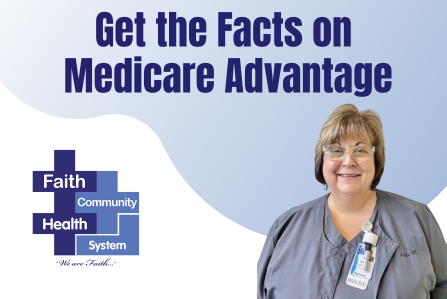It’s Medicare enrollment time again. If you are 65 or older, you have until Dec. 7 to make a change to your Medicare enrollment.*
Are you considering making a switch to Medicare Advantage during this year’s open enrollment period? Or, maybe you’re a first-time Medicare enrollee, trying to make heads or tails of the many options available to you?
Questions abound: What’s the best option for you? Which choice will provide the coverage and care you need? Which option comes at a cost that works with your budget?
At first glance, the HMO-style Medicare Advantage plan, also known as Medicare Part C, might appear to make some sense. You can opt for a lower out-of-pocket monthly premium than traditional Medicare Part A. And, yes, you’ll get most of your medical care covered.
But, when you watch those TV commercials that make Medicare Advantage sound so easy and too good to be true, you might want to take a moment to question what you are seeing.
Be aware, first and foremost, that Medicare Advantage is private insurance from big FOR PROFIT insurance companies. Insurance companies are in business for one thing: making money.
You know better than anyone: When something sounds too good to be true there’s usually a catch! In this case, the “catch” with Medicare Advantage is that you are giving the insurance companies – not your doctors – power over your healthcare.
“Medicare Advantage won’t come through for you when you need it most,” said Paula Edwards, chief nursing officer at Faith Community Health System. “Why would you want the insurance company to be the one to decide if you need rehab after a stroke or an accident? Shouldn’t that decision be between you and your doctor?”
Now is a great time, during open enrollment, to find out if Medicare Advantage is as good as it sounds or if traditional Medicare is worth the few extra bucks.
If you are confused, it’s understandable.
Medicare and your options surrounding it are not easy to understand. Let’s break it down. As an educated consumer, you’re smart to explore your Medicare options thoroughly, before selecting a plan.
Medicare Advantage Part C coverage will typically allow you access to basic medical care including widely used prescription drugs. You’ll also be covered for basic vision, dental and hearing care. On a monthly basis, you won’t have any out-of-pocket premium to pay and there is a cap on out-of-pocket costs.
Stop! That’s where the benefits stop and the challenges begin.
It sounds great on paper – or on the TV screen. But what happens when the insurance company doesn’t allow you to get the services you need? Remember, there’s got to be a reason they can cap your costs! They won’t give the green light for many services your doctor may say you need.
For example, what happens in the case of injury, heart attack, stroke or any other unexpected health crisis? You’ll need more extensive care, over a longer period of time. However, since Medicare Advantage plans are offered by private healthcare insurers rather than by the federal government, not all physicians and other healthcare providers will participate in every (or any) Medicare Advantage plan offered.
“Medicare Advantage plans typically provide the minimum of care and may not cover all needed services,” said Edwards, noting rehab, occupational therapy, etc., are closely guarded by the Part C insurance companies. Patients are given a few visits and then are not permitted more.
“A few physical therapy visits, for example, won’t be enough to get you back on your feet after a major health event,” she added.
In summary…
If you are a senior in good health and happen to know that you will never need more than basic routine healthcare, Medicare Advantage Part C (an HMO) might work out well for you.
However, in the more likely scenario that you have no idea what the future may bring regarding your health, you owe it to yourself to keep your options open when it comes to your insurance plan.
Choosing the right Medicare plan is a complicated and sometimes stressful process. And, if you live in a rural community, as so many aging Americans do, there’s even more to consider than just the expense of the plan you’re considering. You can’t put a price tag on your health and well-being, so make sure the plan you choose will provide the care you need today and in the future.
“Traditional Medicare affords you the greatest number of options and puts your physician in charge of your care – not the insurance companies,” Edwards said.
*Medicare open enrollment is a period of time each year – from Sept. 17 to Dec. 7 – when you can make changes to your Medicare plan. Open enrollment is different from your initial enrollment period which begins three months before you turn 65 and ends three months after you turn 65. Your Medicare coverage begins the first day of the month you turn 65.


